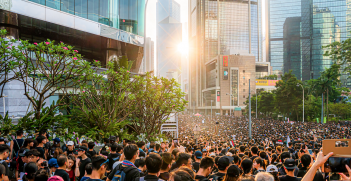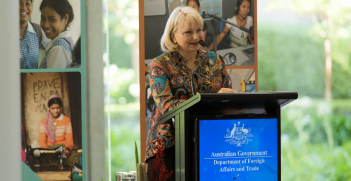Women's Rights Advocacy in Hong Kong: Challenges and Prospects Under the National Security Law

How does the Hong Kong National Security Law further complicate women’s rights advocacy? This article unpacks the law’s impacts on women’s organisations and the potential legislative ramifications on women’s rights amid growing state interference.
The Hong Kong Women Workers’ Association cancelled a police-approved rally which planned to commemorate International Women’s Day and foster the rights of women last year. This decision came after the police cited the risk of violence and threatened to arrest key activists. The organised rally was the first approved by the police following the withdrawal of social distancing measures during the COVID-19 pandemic. This year will mark the beginning of the fourth year of the National Security Law (NSL) in operation. It presents an opportune moment to assess the law’s effects on the development of women’s political participation and representation, which serves as a pertinent starting point for further understanding how the law erodes human rights in Hong Kong.
Division within Women’s Organisations
Hong Kong women’s movements have thrived, demonstrating influences from Western feminism. These movements began with liberal critiques of gender inequalities, situated in both public and private domains. Now they address an extensive range of issues, spanning from economic to familial and sexual matters. Interestingly, women’s organisations in Hong Kong are divided into two camps – the pro-PRC and the pro-democracy camps. The former function as umbrella organisations and groups aligned with the state’s united front strategy, while the latter are grassroots organisations advocating for gender-based rights. They work and enhance the rights of women through a variety of approaches and strategies, including lobbying, legislative initiatives, public education, research, publication, and the provision of services. In the mid-2000s, their advocacy against violence against women exemplified their shared interests on gender issues. For instance, following the death of a women and her two daughters after she was turned away from the police, women’s organisations from both camps expressed outrage over the mishandling of a domestic violence case by the police. They urged the police to apologise to the affected relatives and demanded an investigation into the handling of the case. This incident highlighted the unprecedented outspokenness of pro-PRC women’s organisations.
Pro-PRC Women’s Organisations: Ties with the state
With political transition and the intensifying state manipulation in Hong Kong, the ties between the state and pro-PRC women’s organisations have strengthened, accentuating the growing divergence in the perspectives on gender issues between pro-PRC and pro-democracy women’s organisations. The Hong Kong Federation of Women (HKFW), as the leading pro-PRC women’s organisation, actively supports the Hong Kong government and the Police Force. One prominent example is its involvement during the 2019 anti-extradition movement. Not only did it issue a statement titled “Supporting the Government and the Police to Act in Accordance with the Law” to condemn the vandalism by protestors in the Legislative Council Complex on 1 July 2019, but also organised a rally with other pro-PRC women’s organisations themed “Defend Homeland”on 25 August 2019. Pansy Ho, the Chairperson, and Annie Wu, the Supervising Advisor of the HKFW criticised “a small group of radical protestors” for deploying “systematic and calculated violence acts” at the United Nations Human Rights Council, completely neglecting police brutality against protestors. Furthermore, the HKFW recently hosted a seminar to provide explanations and insights on the implementation of the Hong Kong National Security Law for the government.
Furthermore, in briefly reviewing the highlighted activities and events documented on the webpage of the HKFW, it reveals hundreds of events organised between 1999 and 2004 with nearly half of them related to national day and Hong Kong Special Administrative Region anniversary celebrations, and the organisation’s annual gala dinners. However, the last time the HKFW commissioned research on gender inequalities and women’s issues was in 2005. Efforts to implement training program aimed at cultivating women political leaders and enhancing women’s political awareness have not been readily apparent.
Pro-democracy Women’s Organisations: Challenges and Initiatives
By contrast, pro-democracy women’s organisations are more progressive and vocal in advancing women’s rights and gender justice. They have formed the Hong Kong Women’s Coalition on Equal Opportunities (HKWCEO), which has demanded that Legislative Council candidates sign a pledge list on women’s issues, including economics and employment, family, and community. Additionally, they assess the role of the Hong Kong’s Women’s Commission in promoting gender mainstreaming in policymaking and monitor Policy Addresses to ensure the inclusion of women’s and gender issues in Hong Kong’s development agenda. During the 2014 Umbrella Movement and the 2019 anti-extradition movement, news and rumours of politically-motivated sexual violence against protestors were disseminated. The HKWCEO, along with other pro-democracy women’s organisations and groups, condemned the sexual violence against protestors and provided assistance to survivors. They established a hotline for protestors seeking help and organised the #ProtestToo campaign to show solidarity with protestors.
Furthermore, the Association Concerning Sexual Violence Against Women conducted an online survey to investigate experiences of sexual violence during the anti-extradition movement. As mentioned in the introduction, any public assembly, rally, and protest must receive approval from the Commissioner of Police. The possibility of pro-democracy women’s organisations continuing their strategies to raise public awareness and monitor government effort about women’s issues is uncertain following the implementation of the NSL. The cancellation of a rally by the Hong Kong Women Workers’ Association in 2023 underscores the limited space for advancing women’s labour rights through demonstrations. It is believed that the increasing restrictions on protests and rallies, coupled with the close ties of pro-PRC women’s organisations with the Hong Kong government and limited progress in advancing women’s right, concerns are inevitably raised.
Disbandment of Women’s Organisations and Political Parties
On top of eroding freedom of expression regarding women’s rights, a women’s labour organisation affiliated with the Hong Kong Confederation of Trade Unions, which had advocated for women’s labour rights for over 30 years, was dissolved in 2021, citing the impact of the NSL. In the aftermath of the NSL, there are only three likely outcomes for women’s organisations in Hong Kong – aligning with the state as pro-PRC women’s organisations, disbanding altogether, or shifting their focus away from women’s political rights development. In the past, pro-democracy women’s organisations initiated training and mentoring programs to nurture women seeking candidacy in elections. They also educated women voters on voting for political representatives based on their personal interests. These pro-democracy women’s organisations are now facing resource constraints; public and private funding sources are increasingly being withdrawn or facing more stringent application processes. Naturally, this has reduced political representation with fewer opportunities for participation for women in Hong Kong.
Potential Legislative Impacts
The political landscape witnessed a contraction in opportunities for pro-democracy political parties following the implementation of a new electoral system. Notably, the Civic Party, the second-largest pro-democracy political party, is scheduled for dissolution in March of this year. The dissolution of political parties could potentially impede legislative progress on women’s rights. A comparison of the signed pledge list regarding women’s rights and gender equality from the 2016 Legislative Council Election reveals that pro-democracy political parties demonstrate greater liberalism in their support for women’s rights across various domains. These domains include politics, economy and employment, family and community, healthcare and wellness, and women and violence. This assertion gains credibility from the absence of responses from pro-establishment parties, such as the Hong Kong Federation of Trade Unions, Democratic Alliance for the Betterment and Progress of Hong Kong (DAB), Liberal Party, and Business and Professionals Alliance for Hong Kong.
The shrinking space for pro-democracy parties, coupled with the current composition of the Legislative Council, dominated entirely by pro-PRC Legislative Councillors, raises concerns about how this situation may impact the progress of lawmaking on women’s rights. Chinese President Xi Jinping calls for Chinese women to embrace “traditional virtues” of marriage and to build families and raise children to “rejuvenate” the nation by increasing marriage and birth rates, along with reducing the aging population. It remains to be seen whether Legislative Council members in Hong Kong will echo this sentiment, potentially reframing related discourse under the umbrella of national security. Would a woman commit to a violation of the NSL if she rejects this notion?
Conclusion and Future Prospects
In sum, the landscape for women’s representation and participation in Hong Kong is becoming increasingly restricted. The alignment of pro-PRC women’s organisations with the state, coupled with the shrinking space for pro-democracy counterparts and limited representation in the Legislative Council, significantly constrains opportunities for voicing women’s concerns and enacting gender-sensitive policies in Hong Kong.
Despite these challenges, the role played by pro-democracy women’s organisations remains crucial. Their continued advocacy on gender-based issues, particularly concerning violence against women, including domestic violence, sexual violence, and image violence, remains essential in addressing pressing social issues and advancing women’s rights in Hong Kong.
The author is a researcher at a university in the UK who works on gender and politics, specializing in women’s political participation.
This article is published under a Creative Commons Licence and may be republished with attribution.





